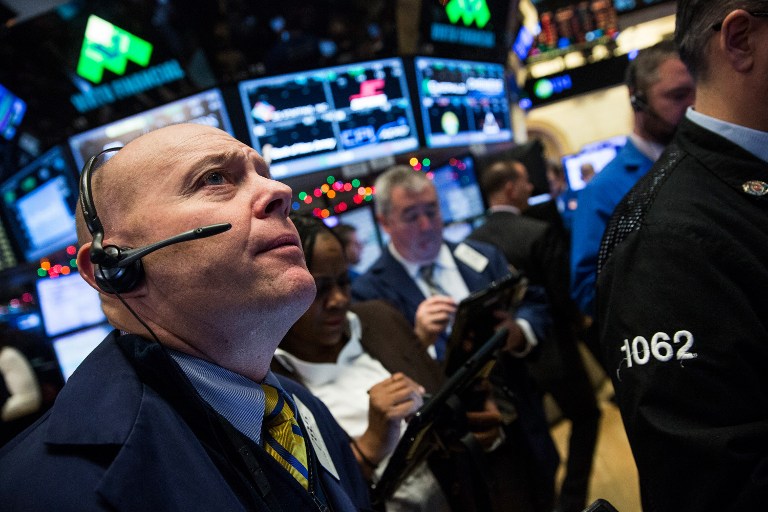World watches with US Fed expected to raise rate

Traders work on the floor of the New York Stock Exchange during the morning of December 14, 2015 in New York City. The Federal Reserve may make an announcement this week raising interest rates. Photo by Andrew Burton/Getty Images) Andrew Burton/Getty Images/AFP
WASHINGTON—The US Federal Reserve is expected Wednesday to increase its base interest rate for the first time since 2006, a momentous step that will have repercussions across the global financial system.
With the world’s biggest economy now growing steadily — if not robustly — the Fed is expected to conclude that it is time to get away from the ultra-low interest rates that have underpinned the recovery from the 2008-2009 Great Recession.
READ: Decisive US Fed seen ending wild market swings
Most economists expect the so-called federal funds rate will be lifted from the current 0-0.25 percent by a quarter percentage point.
The move, a well-signaled and modest increase, will mark the beginning of a likely slow series of rate hikes to “normalize” central bank policy over the next two years.
Article continues after this advertisementBut it will also mean raising the cost of borrowing for everyone from foreign governments and companies to home and car buyers, while also better rewarding savers on their bank accounts.
Article continues after this advertisementREAD: PH resilient from US Fed rate hike
A Fed rate increase “is a positive sign for the US economy — to be welcomed, not feared,” said Stuart Hoffman, chief economist at PNC Financial Services Group.
Some economists argue the US economy is still not ready for tighter money, and that there is still no compelling reason to hike — like the threat of inflation.
But most analysts believe the Federal Open Market Committee, the Fed policy board, will take the first step, and then see what happens before plotting their next move.
“The Fed is not trying to slow down a fast-growing economy or dampen runaway inflation,” said Sam Stovall, equity strategist at S&P Capital IQ. A hike would be “an attempt to recalibrate, not restrain.”
Arguing for an increase, Fed Chair Janet Yellen said on December 2 that the Fed expects the economy will continue to grow steadily through 2016 and that the challenges of low inflation and jobs market slack will diminish next year.
Moreover, she added, if the Fed waits too long, “we would likely end up having to tighten policy relatively abruptly to keep the economy from significantly overshooting both of our goals.”
The FOMC will announce its decision at 2:00 pm (1900 GMT), along with Fed projections for growth, inflation and interest rates over the next two years.
Shortly after that, Yellen meets the media to explain the decision.
Too soon?
Raising the rate by a notch is not a big change in monetary policy — “a baby step,” said Hoffman — but after nearly three years preparing the ground, it is a monumental stride for the FOMC.
Even so, the move remains somewhat controversial, especially as much of the rest of the world is easing monetary policy to counter weak economic growth.
Economist Paul Krugman warned that a rate hike “could end the run of good economic news.”
“And this would be much more serious than a modest uptick in inflation because it’s not at all clear what the Fed could do to fix its mistake.”
Historically, noted John Normand at JP Morgan Securities, “Macroeconomic and market conditions have rarely looked so fragile ahead of the first Fed hike.”
So the spotlight will be on Yellen’s press conference to see how she characterizes the economy’s strength and depicts plans for future rate increases.
Speculation on how fast the Fed will hike ranges from between two and four quarter-point increases next year, depending on inflation. A faster pace would more quickly tighten the economy and send the US dollar higher, and possibly dampen equity markets.